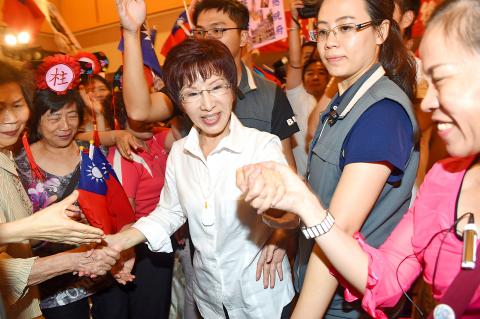Chinese Nationalist Party (KMT) Central Standing Committee member Chiang Shuo-ping (江碩平) yesterday demanded a provisional party congress be held to review whether the party’s presidential candidate, Hung Shiu-chu (洪秀柱), should be replaced, dealing a severe blow to Hung’s campaign and further fueling rumors of division within the party over Hung’s candidacy.
KMT sources were yesterday cited by a TVBS report as saying that the most recent poll conducted by the KMT indicated that Democratic Progressive Party presidential candidate Tsai Ing-wen’s (蔡英文) approval rating had soared to a record level of 45 percent, while Hung’s rating had plummeted to 13 percent.
Anonymous party members said Hung’s support rating was critically low and might severely damage the KMT’s standing in next year’s legislative elections.

Photo: Chien Jung-fong, Taipei Times
Chiang yesterday said he planned to propose that the party hold a provisional party congress at a Central Standing Committee meeting on Wednesday.
KMT sources added that “more than half” of the Central Standing Committee members supported convening a provisional party congress to address the issue of Hung’s candidacy.
In response to media queries on the possibility of party members proposing a withdrawal of Hung’s candidacy, KMT Chairman Eric Chu (朱立倫) earlier yesterday said KMT members are free to “communicate” their opinions via all available channels, adding that party solidarity would be preserved as long as “all come to an agreement.”
In related news, a high-level unnamed KMT source was quoted by the Chinese-language United Daily News as saying yesterday that Hung should not advocate “ultimate unification with China,” because it is not supported by mainstream Taiwanese public opinion.
In a radio interview on Friday Hung said the Republic of China Constitution “calls for ultimate unification with China.”
She said that President Ma Ying-jeou’s (馬英九) stances on the so-called “1992 consensus,” the maintenance of the “status quo,” and “one China, different interpretations,” and “no unification, no independence and no use of force” have “accomplished their medium-term goals,” and that there should now be “political dialogue with China” concerning unification.
Hung had previously advocated the idea of “one China, same interpretation,” only to see her approval rating tank, compelling Hung to “return” to Ma’s standpoints, the source was quoted as saying in the report, who added that Hung “should remember this lesson.”
The “1992 consensus” refers to a supposed tacit understanding between the KMT and Beijing that both sides agree there is “one China,” with each side having its own interpretation of what “China” means.
Hung “is a KMT candidate” who should “ground [her] cross-strait narrative on KMT policies,” or risk the “profound disappointment” of Ma and the party, the source was quoted by the United Daily News as saying.
Hung should “take the initiative” and demand that Tsai, who has said maintaining the “status quo” is the DPP’s policy, clarify how she would define “status quo” and how it would be maintained, the source said.
Additional reporting by Lee Ya-wen

Tropical Storm Gaemi strengthened into a typhoon at 2pm yesterday, and could make landfall in Yilan County tomorrow, the Central Weather Administration (CWA) said yesterday. The agency was scheduled to issue a sea warning at 11:30pm yesterday, and could issue a land warning later today. Gaemi was moving north-northwest at 4kph, carrying maximum sustained winds near its center of up to 118.8kph and gusts of 154.8kph. The circumference is forecast to reach eastern Taiwan tomorrow morning, with the center making landfall in Yilan County later that night before departing from the north coast, CWA weather forecaster Kuan Shin-ping (官欣平) said yesterday. Uncertainty remains and

SEA WARNING LIKELY: The storm, named Gaemi, could become a moderate typhoon on Wednesday or Thursday, with the Taipei City Government preparing for flooding A tropical depression east of the Philippines developed into a tropical storm named Gaemi at 2pm yesterday, and was moving toward eastern Taiwan, the Central Weather Administration (CWA) said. Gaemi could begin to affect Taiwan proper on Tuesday, lasting until Friday, and could develop into a moderate typhoon on Wednesday or Thursday, it said. A sea warning for Gaemi could be issued as early as Tuesday morning, it added. Gaemi, the third tropical storm in the Pacific Ocean this typhoon season, is projected to begin moving northwest today, and be closest to Taiwan on Wednesday or Thursday, the agency said. Today, there would likely

DISRUPTIONS: The high-speed rail is to operate as normal, while several airlines either canceled flights or announced early departures or late arrivals Schools and offices in 15 cities and counties are to be closed today due to Typhoon Gaemi, local governments announced last night. The 15 are: Taipei, New Taipei City, Taoyuan, Tainan, Keelung, Hsinchu and Kaohsiung, as well as Yilan, Hualien, Hsinchu, Miaoli, Chiayi, Pingtung, Penghu and Lienchiang counties. People should brace for torrential rainfall brought by the storm, with its center forecast to make landfall on the east coast between tonight and tomorrow morning, the Central Weather Administration (CWA) said. The agency issued a sea warning for the typhoon at 11:30pm on Monday, followed by a land warning at 11:30am yesterday. As of

CASUALTY: A 70-year-old woman was killed by a falling tree in Kaohsiung as the premier warned all government agencies to remain on high alert for the next 24 hours Schools and offices nationwide are to be closed for a second day today as Typhoon Gaemi crosses over the nation, bringing torrential rain and whipping winds. Gaemi was forecast to make landfall late last night. From Tuesday night, its outer band brought substantial rainfall and strong winds to the nation. As of 6:15pm last night, the typhoon’s center was 20km southeast of Hualien County, Central Weather Administration (CWA) data showed. It was moving at 19kph and had a radius of 250km. As of 3pm yesterday, one woman had died, while 58 people were injured, the Central Emergency Operation Center said. The 70-year-old